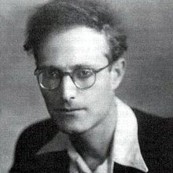传记
Alexander Lazarevich Lokshin (1920 – 1987) was a Russian composer of classical music. He was born on September 19, 1920, in the town of Biysk, in the Altai Region, Western Siberia, and died in Moscow on June 11, 1987.
Admirer of Mahler and Alban Berg, he created his own musical language; he wrote eleven symphonies plus symphonic works "Les Fleurs du Mal" (1939) on Baudelaire's poems, "Three Scenes from Goethe's Faust" (1973, 1980), cantata "Mater Dolorosa" (1977) on verses from Akhmatova's "Requiem", etc. Only symphony No.4 is purely instrumental; all other symphonies include vocal parts. Symphony №3 by Lokshin was written on Kipling's verses, a ballet "Fedra" was staged on music of symphony №4. Dmitry Shostakovich and Maria Yudina considered Lokshin's Requiem (symphony №1) as a genial music. Piano output of Lokshin is scarce: He wrote a cycle of piano variations for Maria Grinberg (1953) and another one for Elena Kuschnerova (1982).
Composer's father Lazar Lokshin was an accountant, and his mother Maria Korotkina was a midwife. Lokshin's sister Maria was born in 1914. The family of the composer suffered from communistic repressions, their possessions were confiscated, and Maria was expelled from the Medical School for a joke.
After the family moved to Novosibirsk, young Lokshin was trained at school by excellent teachers banned to Siberia from Moscow and Sankt-Petersburg. Renowned pianist Alexei Stein, former professor of the Saint-Petersburg Conservatory, laid foundations of Lokshin's excellent pianism.
In 1936 Lokshin arrived to Moscow with Alexei Stein's recommendation letter, was examined by Heinrich Neuhaus (Russian: Генрих Нейгауз), Director of the Moscow Conservatory, and accepted as the student of the Moscow Central Music School and after 6 months as a student of the Moscow Conservatory. He studied composition with a great Russian composer Nikolai Myaskovsky (Russian: Николай Мясковский).
In 1941 Lokshin presented his symphonic work "Les Fleurs du Mal" (BIS, 2010) as his diploma work at graduation from the Moscow Conservatory. However, as the lyrics by Charles Baudelaire was considered as contradicting the communistic ideology by the censors, Lokshin was denied the Moscow Conservatory Diploma and was not allowed to take the state examinations. Nevertheless, he already was a member of the Composer's Union.
During the World War II Lokshin was in Moscow and later back in Novosibirsk. In July 1941 Lokshin enters the people's volunteer corps but after a strong bout of stomach ulcher he proves to be unfit for military service. During summer and the beginning of autumn 1941 he puts out incendiary bombs on the roof of Moscow conservatory during air raids; then he evacuates to Novosibirsk. The arrival of the Leningrad Symphony Orchestra in Novosibirsk, with Evgeny Mravinsky conducting the performance of Lokshin's vocal-symphonic poem "Wait for Me" (verses by Konstantin Simonov), and Ivan Sollertinsky highly praising it, helped Lokshin's comeback to Moscow after the end of the war. He was able to take the state examinations, obtained the Conservatory diploma with "Wait for me" as the diploma work and with Nikolai Myaskovsky's support was hired as Assistant Lecturer in Instrumentation at the Moscow Conservatory. In this capacity he worked during 1945-1948, the only working position held by the composer during his entire life.
At the height of the anti-cosmopolitism campaign and music purges of 1948, powered by Andrei Zhdanov, Lokshin was expelled from the Moscow Conservatory for the popularization of ideologically alien music of Mahler, Berg, Stravinsky, and Shostakovich among students. Efforts of Nikolai Myaskovsky, Maria Yudina, and Elena Gnessina to get him another job were in vain. The rest of his life Lokshin supported the life of his family by composing music for films and performances.
In addition, three former prisoners of GULAG accused him of being an informer for the Soviet secret police NKVD-KGB. In the absence of formal accusations and legal proofs, composer's reputation was ruined by rumours circulating from mouth to mouth across the Soviet cultural elite. Performances of his music had become rare and were met with resistance from both Communist Party officials and liberally thinking intellectuals. Still, most of Lokshin's works have been performed and recorded at least one time. Among his compositions which were never performed there are Symphony No.6 on the verses by Alexander Blok and "Tarakanishche", a brief comic oratorium (with anti-Soviet implication) on verses by Korney Chukovsky. Rudolf Barshai in collaboration with Viktor Popov have prepared Symphony №6 for execution, however the performance of this composition was prohibited by Communist party for the reason of its being too mournful for soviet public. Among Lokshin's own compositions which he has never heard performed there is cantata "Mater Dolorosa" (1977) on verses from Akhmatova's "Requiem". (As is known, at that time the "Requiem" by Akhmatova was prohibited in the Soviet Union.) In 1981 Lokshin had passed the score of "Mater Dolorosa" to the West (for Rudolf Barshai). However, it turned out impossible for R. Barshai to perform this composition in the West; otherwise the consequences for Lokshin could be inpredictable.
As was shown by his son, Lokshin was calumniated: the real source of defamation (that is of Lokshin’s "being an informer") were not the former GULAG prisoners, but the Stalin’s secret police itself, which had employed a practice of deceiving its victims by redirecting their suspicions. (The aim of these efforts was to defend an acting agent of the secret police.) The arguments and documents obtained by Lokshin's son turned out to be sufficient to persuade Elena Bonner to stand up for Lokshin. The fact that Rudolf Barshai has performed Lokshin’s Requiem on the closing of the IV International conference “The Resistance in GULAG” (Moscow, on May, 29th 2002) was an essential step preceding the posthumous rehabilitation of Lokshin.





